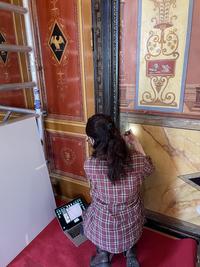
Courses at the Master's Program in Conservation of Cultural Heritage Objects
The first year of the master’s program is comprised of courses within the field of Conservation. The second year is dedicated to an internship and a research-based thesis project.
Specialisation
In the academic year of 2026/2027, we offer mural paintings and stone as a specialisation.
The first year is comprised of both courses within the field of specialisation, and the main field of conservation. The second year is dedicated to an internship and a research-based thesis project. Our courses contain a balance of theoretical and practical subjects, with a strong emphasis on practical and site work.

Year 1
Documentation of Cultural Heritage Objects, 7.5 credits
Course code: KKV704
Syllabus (PDF)
The course gives you knowledge of various technical visualisation tools, software, and methods for documenting cultural heritage objects and artworks, as well as the environments they are exposed to. Focus is given to mural paintings and stone surfaces/objects. During the course, you learn how to critically evaluate how these tools and methods can be used in current projects to enhance the knowledge and understanding of the surfaces/objects and their monitoring.
Advanced analytical methods for conservation, 7.5 credits
Course code: KKV707
Syllabus (PDF)
The course introduces you to several scientific analytical methods that are widely used in contemporary conservation. You learn how to critically evaluate how these tools and methods can be used in current projects to understand original materials and techniques of surfaces/objects, their deterioration, and to inform possible conservation strategies. Theoretical teaching is coupled to practical work in the laboratory and the use of available scientific instruments.
Research Methods in Cultural Heritage Conservation, 7.5 credits
Course code: KKV706
Syllabus (PDF)
The course provides you with the knowledge and skills to perform independent research in cultural heritage conservation.
Current Issues in Conservation, 7.5 credits
Course code: KKV700
Syllabus (PDF)
The course explores modern conservation theories and employs complex case studies to compare ideas and attitudes that influence treatment outcomes and various stakeholders. The course encourages you to develop an informed way of deciding on conservation treatments by adopting an ethical yet open-minded, flexible, and creative approach based on a thorough understanding of all possible factors affecting the condition, interpretation, and understanding of an object, making use of scientific data, as well as considering social and cross-cultural parameters.
Specialisation course 1, 15 credits
Course code: KKV741
Syllabus (PDF)
The course aims to deepen your knowledge within the field of specialisation, mural paintings and stone. A theoretical framework is given for conservation materials and methods, with up-to-date techniques adopted at the international level. In the laboratory, you get the opportunity to experiment with what learnt on replicas, mock-ups, and objects. Field work is performed on real case studies, i.e., mural paintings and stone surfaces/objects: you have the opportunity to work in a real project setting, and set and implement as a team conservation measures, from condition assessment and definition of the problem to setting of performance criteria for the intervention(s) to treatment design and implementation.
Specialisation course 2, 15 credits
Corse code: KKV742
Syllabus (PDF)
The course aims to further deepen your knowledge within the field of specialisation, mural paintings and stone. Further conservation materials and methods are analysed in theory, in the laboratory, and then implemented on site according to the case study under consideration (mural paintings and stone surfaces/objects). You have the opportunity to work in a real project setting, and set and implement as a team conservation measures, from condition assessment and definition of the problem to setting of performance criteria for the intervention(s) to treatment design and implementation.

Year 2
Internship, 30 credits
Course code: KKA200
Syllabus (PDF)
The course mainly consists of practice-oriented education that can involve both practical studio/laboratory work and site work, and participation in discussions around the assignment provided by the internship institution.
Master Thesis in Conservation with Specialisation in Conservation of Cultural Heritage Objects, 30 or 60 credits
Course code and syllabus: KKV730 (PDF) / KKV760 (PDF)
The master’s thesis course provides an opportunity for you to carry out an in-depth study in an area of interest and apply the knowledge and skills acquired during the master's program. The course is based on independent work and can also be part of a bigger research project.


